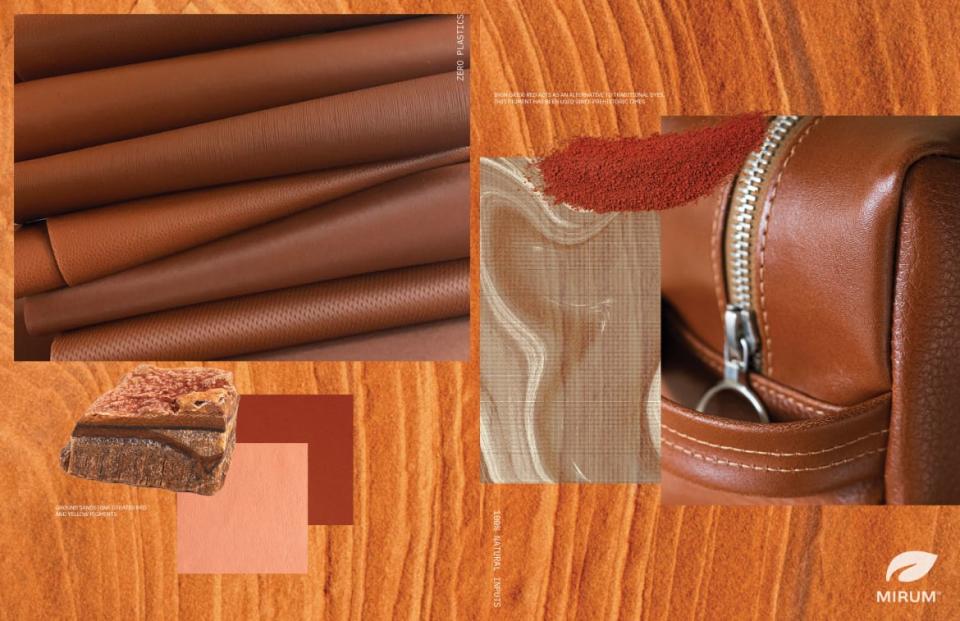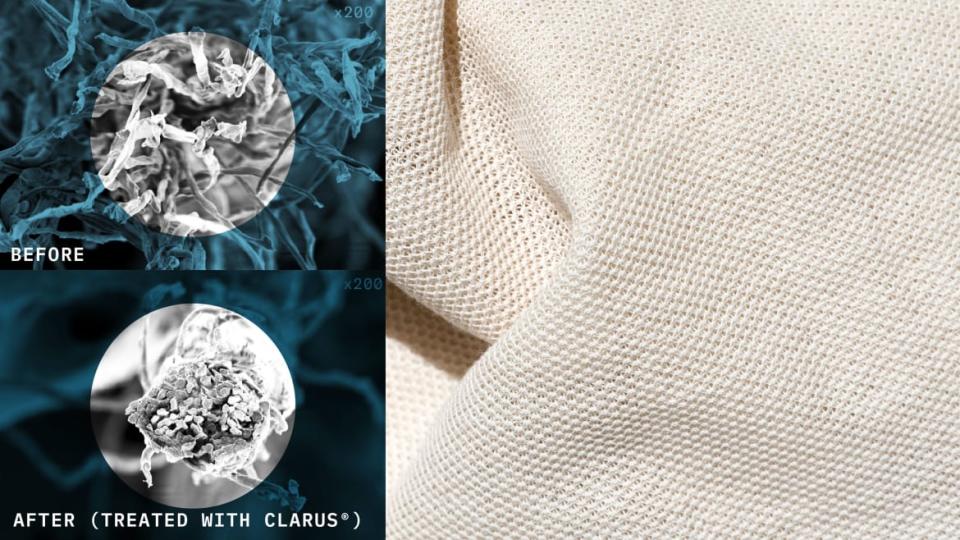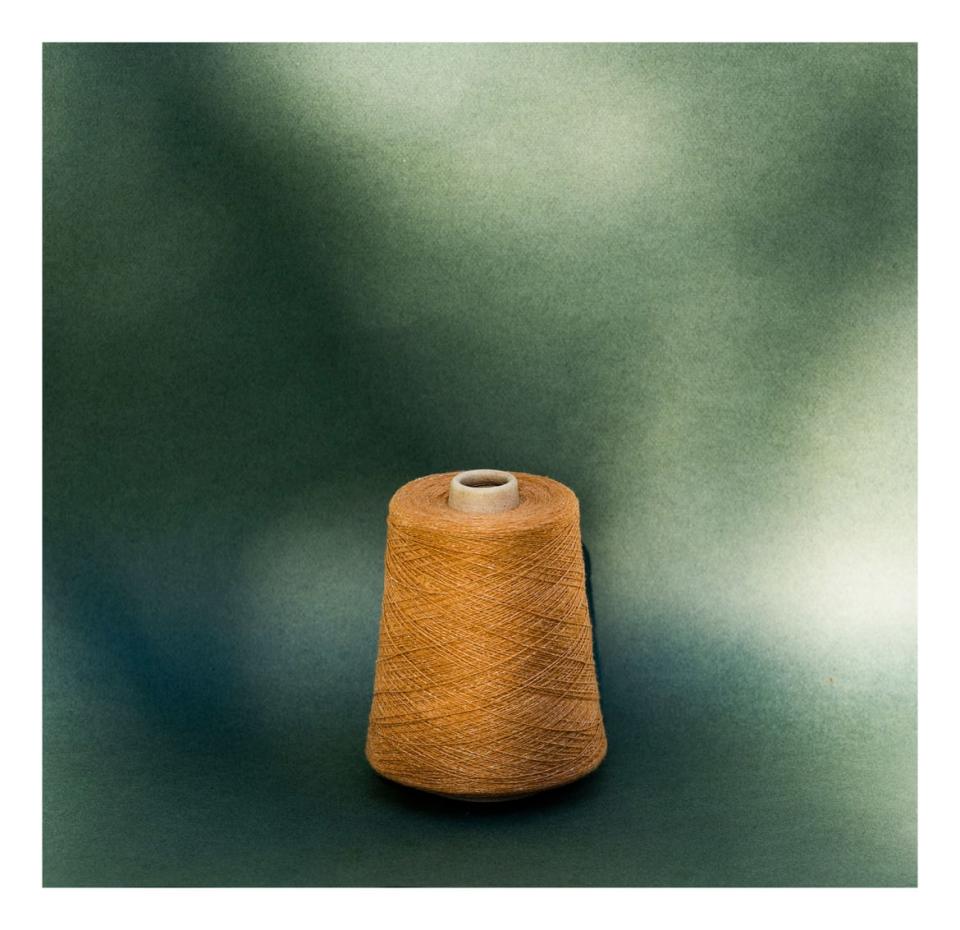This Startup May Know to How to Unlock Sustainable Clothing

You can reuse, reduce, and recycle as much as you want, but it won’t amount to much if you don’t also change the clothes on your back. About 21 billion pounds of clothing are tossed into landfills each year in the U.S. Many of those articles, especially ones designed for working out, are made from synthetics like polyester, nylon and lycra—materials made from fossil fuel-derived plastic. Micro- and nano-sized fiber fragments of these plastics are released into our waterways during laundry, directly contributing to the microplastic pollution accumulating in the waters. Textiles are estimated to produce about 35 percent of all microplastic pollution (recently found in Antarctic snow!) and there are about 2.2 million tons of microfibers filling up the planet’s waters every year.
Scientists are still trying to determine what the effects of microplastics are on the health of humans as well as the environment, though it’s already clear these fragments are toxic to us at the cellular level. The effects on organisms worsen as more and more microplastics are ingested.
Can a Future Fleet of Robotic Fish Clean Up the Ocean?
So is cotton, the king of all natural (read: biodegradable) fibers, with a little dose of chemistry, the key to eradicating the use of synthetics altogether? Luke Haverhals, a chemistry professor at Bradley University in Peoria, Illinois, thinks so. He founded a company, Natural Fiber Welding, that transforms frayed low-grade cotton into a textile that wicks moisture as well as synthetics do—without using plastic.
“We’ve been told for decades that we have to use synthetics because otherwise, the world will fall apart,” Haverhals told the Daily Beast. “But I would rather live in the natural world where we simply live in the constraints of our planet.”

Haverhals has spent years puzzling over how the world could outgrow the use of plastics. Since no one has been able to figure out how to significantly reduce the carbon footprint of plastic manufacturing or make major improvements with plastics recycling (only 5 to 6 percent of all plastics were recycled last year), he has turned looking to naturally available materials and morphing them into something that emulates the qualities of plastic—without the environmental impact.
While teaching at the U.S. Naval Academy, Haverhals and fellow scientists spent several years studying new ionic liquid processes that could turn natural fibers into materials that would have the same characterization as high-performance synthetics. After taking on a teaching position at Bradley University in 2013, Haverhals was ready to bring his research out of the lab and into the real world.

To that effect, he is now a named inventor of a dozen patents (and has about 100 more pending), which has led to his company's novel cotton-based textile CLARUS. Low-grade, throw-away cotton (the stuff that’s used to make Q-tips and paper) is made into yarn and exposed to a special type of liquid salt for a short period of time as it goes through a roll-to-roll machine.
According to Haverhals, this is where the magic happens: Puffy, stringy yarn is broken down by the salt, then fused together to make a stronger cotton textile that has moisture-wicking capabilities that sportswear requires. The development of CLARUS led to the founding of Natural Fiber Welding in 2015.

The company also makes MIRUM, a leather-like textile made from cork, coconut husk, and natural rubber that’s primarily been used to make auto upholstery, bags, wallets, and shoes. “You can literally grind this stuff up and recycle it after use,” said Haverhals.
Ralph Lauren issued a 2022 report that states the company is seeking to expand its production of clothing made from 100 percent cotton. It’s now one of the most high-profile fashion companies to engage with Natural Fiber Welding—calling its partnership part of a larger vision to “contribute to a more circular apparel economy,” a company spokesman told The Daily Beast.

It now markets the RLX CLARUS Polo, which “uses virgin and recycled cotton in ways that were never before possible,” said the spokesman. The shirt is sold for about $95 more than the company’s regular polo shirts. Though more expensive, a survey run by McKinsey in 2020 suggests there’s an appetite from consumers for more sustainable clothing products—and they’re willing to pay more to get them. (When asked about the higher price markup, Haverhals told The Daily Beast his textiles are at “industry relevant pricing” today and said it has no control over how much a retailer marks up their product.)
Though still operating like a smaller startup, Natural Fiber Welding is making rapid moves to grow. The company recently raised $85 million in investor funds and is planning to open a larger manufacturing plant in the Southeast in addition to its current facility in Peoria, Illinois. It is also talking to Smart Shirts, a major Hong Kong-based global textile maker and investor, to make sustainable clothing globally. Haverhals said he’ll use additional money to expand the company’s product line-up, including the creation of stronger shoe soles made from plants.

The new interest in turning textiles into a greener and more sustainable industry is long overdue. Synthetics have dominated the industry since the 1990s, accounting for about 62 percent of global fiber production in 2020, according to the Textile Exchange. Polyester alone made up 52 percent of the market.
Haverhals has a lot of passion to disrupt the plastic status quo. “When I started this company, my goal was to have a planetary effect,” he said. “Otherwise the petrochemical companies will keep doing what they’re doing.”

Get the Daily Beast's biggest scoops and scandals delivered right to your inbox. Sign up now.
Stay informed and gain unlimited access to the Daily Beast's unmatched reporting. Subscribe now.

